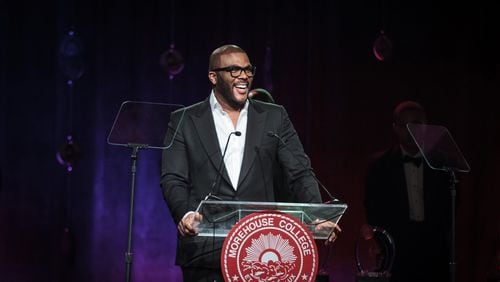Candle in the Dark, a showcase for the Bennie Awards and named for the late Morehouse president honor of Dr. Benjamin E. Mays, was held on Saturday at the Hyatt Regency in downtown Atlanta. Awarded to outstanding alumni for leadership and service, this year’s Bennies were given to two 1996 Morehouse graduates: theologian Jonathan L. Walton, who teaches at Harvard Divinity School, and Theodore Colbert III, who serves as the chief information officer and senior vice president of information and analytics at Boeing. Three Candle in the Dark honors, which are given to non-Morehouse alumni for excellence in their fields, were awarded to Jon Platt, chairman and CEO of music publishing powerhouse Warner/Chappell Music, entertainment mogul Tyler Perry and music superstar Usher Raymond IV.
During the main ceremony with Dondre T. Whitfield, who currently stars as Remy on the Ava DuVernay-created series “Queen Sugar” on OWN: The Oprah Winfrey Network, Morehouse students were extremely active throughout the program. They served as ushers, presented all the main intros with celebrattory, dramatic flair. Music was even provided by the Morehouse College Jazz Ensemble.
“There weren’t male role models,” Tyler Perry, despite being sick that night, said of his childhood in New Orleans at the gala. He spoke of participating in a program for his friend Oprah Winfrey that featured the young men she had helped attend Morehouse. Perry said that the “black men, standing upright, professionals, speaking well” profoundly affected him. “I wish they were showing more images of what’s going on at Morehouse,” said Perry.
Unlike Oscar contender “Hidden Figures,” which filmed a little on its campus, Morehouse College and its contributions aren’t a complete mystery to most. Still, as the few non-Morehouse affiliates in attendance learned during its 29th annual Candle in the Dark gala, its orbit is in a galaxy all its own. This year that was amplified as the premier institution for the higher education of young black men celebrated its 150th anniversary, a remarkable milestone.
“If you consider that there were once over 300 HBCUs, most of which died in infancy, lasting 150 years is nothing but amazing grace,” outgoing Morehouse president and alumnus (a 1979 Morehouse graduate) Dr. John Silvanus Wilson said at the beginning of the evening.
Prior to Saturday evening's event, a Reflections of Excellence programs, held earlier in the day on campus at the Ray Charles Performing Arts Center, brought the honorees, with the exception of Perry who was battling the flu, to students and others who could not afford the $400-per-person gala. Walton, Colbert, Platt and Raymond each revealed their journey and shared what drives them today. Raymond and Platt, who have known each other for at least 20 years with Platt initially signing him to a publishing deal when he was at EMI, shared the value of friendship even in the music industry.
Extremely moved by the honor, Platt, with his mother, siblings, wife and 13-year-old son in attendance, admitted to gala attendees that, until recently, he had never been comfortable being identified as “the highest ranking black executive in the music industry.” But recently he “came to a new way of thinking.”
“Why not be known as the highest ranking black in the music industry,” Platt told the crowd. “I say this not for myself. I say that for these Morehouse men that are coming up because I think it’s my responsibility to show them what black leadership looks like.”
About the Author






